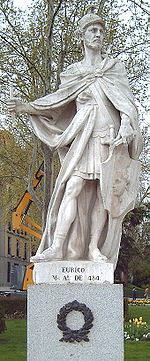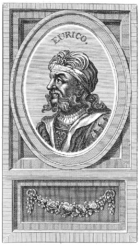
Euric
Encyclopedia

Spanish language
Spanish , also known as Castilian , is a Romance language in the Ibero-Romance group that evolved from several languages and dialects in central-northern Iberia around the 9th century and gradually spread with the expansion of the Kingdom of Castile into central and southern Iberia during the...
and Portuguese
Portuguese language
Portuguese is a Romance language that arose in the medieval Kingdom of Galicia, nowadays Galicia and Northern Portugal. The southern part of the Kingdom of Galicia became independent as the County of Portugal in 1095...
(c. 415 – 484), Son of Theodoric I
Theodoric I
Theodoric I sometimes called Theodorid and in Spanish, Portuguese and Italian Teodorico, was the King of the Visigoths from 418 to 451. An illegitimate son of Alaric, Theodoric is famous for defeating Attila at the Battle of the Catalaunian Plains in 451, where he was mortally wounded.-Early...
and the younger brother of Theodoric II
Theodoric II
Theodoric II was King of Visigoths from 453 to 466.Theoderic II, son of Theodoric I, obtained the throne by killing his elder brother Thorismund...
and ruled as king of the Visigoths, with his capital at Toulouse
Toulouse
Toulouse is a city in the Haute-Garonne department in southwestern FranceIt lies on the banks of the River Garonne, 590 km away from Paris and half-way between the Atlantic Ocean and the Mediterranean Sea...
, from 466 until his death in 484.
He inherited a large portion of the Visigothic possessions in the Aquitaine
Aquitaine
Aquitaine , archaic Guyenne/Guienne , is one of the 27 regions of France, in the south-western part of metropolitan France, along the Atlantic Ocean and the Pyrenees mountain range on the border with Spain. It comprises the 5 departments of Dordogne, :Lot et Garonne, :Pyrénées-Atlantiques, Landes...
region of Gaul
Gaul
Gaul was a region of Western Europe during the Iron Age and Roman era, encompassing present day France, Luxembourg and Belgium, most of Switzerland, the western part of Northern Italy, as well as the parts of the Netherlands and Germany on the left bank of the Rhine. The Gauls were the speakers of...
, an area that had been under Visigothic control since 415. Over the decades the Visigoths had gradually expanded their holdings at the expense of the weak Roman government, advancing well into Hispania
Hispania
Another theory holds that the name derives from Ezpanna, the Basque word for "border" or "edge", thus meaning the farthest area or place. Isidore of Sevilla considered Hispania derived from Hispalis....
in the process.
Upon becoming king, Euric defeated several other Visigothic kings and chieftains in a series of civil wars and soon became the first ruler of a truly unified Visigothic nation. Taking advantage of the Romans' problems, he extended Visigothic power in Hispania, driving the Suevi into the northwest of Iberia. By the time the Western Roman Empire
Western Roman Empire
The Western Roman Empire was the western half of the Roman Empire after its division by Diocletian in 285; the other half of the Roman Empire was the Eastern Roman Empire, commonly referred to today as the Byzantine Empire....
ended in 476 he controlled nearly the entire Iberian peninsula
Iberian Peninsula
The Iberian Peninsula , sometimes called Iberia, is located in the extreme southwest of Europe and includes the modern-day sovereign states of Spain, Portugal and Andorra, as well as the British Overseas Territory of Gibraltar...
.
In 470 Euric defeated an attempted invasion of Gaul by the British king
King of the Britons
The Britons or Brythons were the Celtic-speaking people of what is now England, Wales and southern Scotland, whose ethnic identity is today maintained by the Welsh, Cornish and Bretons...
Riothamus
Riothamus
Riothamus was a Romano-British military leader, who was active circa AD 470. He fought against the Goths in alliance with the declining Roman Empire. He is called "King of the Britons" by the 6th-Century historian Jordanes, but the extent of his realm is unclear...
and expanded his kingdom even further north, possibly as far as the Somme River
Somme River
The Somme is a river in Picardy, northern France. The name Somme comes from a Celtic word meaning tranquility. The department Somme was named after this river....
, the March of Frankish
Frankish Empire
Francia or Frankia, later also called the Frankish Empire , Frankish Kingdom , Frankish Realm or occasionally Frankland, was the territory inhabited and ruled by the Franks from the 3rd to the 10th century...
territory.
Previous Visigothic kings had officially ruled only as legates of the Roman Emperor but Euric was the first to declare his complete independence from the puppet emperors. In 475 he forced the Western Emperor Julius Nepos
Julius Nepos
Julius Nepos was Western Roman Emperor de facto from 474 to 475 and de jure until 480. Some historians consider him to be the last Western Roman Emperor, while others consider the western line to have ended with Romulus Augustulus in 476...
to recognize his full independence in exchange for the return of the Provence
Provence
Provence ; Provençal: Provença in classical norm or Prouvènço in Mistralian norm) is a region of south eastern France on the Mediterranean adjacent to Italy. It is part of the administrative région of Provence-Alpes-Côte d'Azur...
region of Gaul. The Roman citizens of Hispania then pledged their allegiance to Euric, recognizing him as their king. In the same year Clermont(-Ferrand)
Clermont-Ferrand
Clermont-Ferrand is a city and commune of France, in the Auvergne region, with a population of 140,700 . Its metropolitan area had 409,558 inhabitants at the 1999 census. It is the prefecture of the Puy-de-Dôme department...
surrendered to him after a long siege, and its bishop, Sidonius Apollinaris
Sidonius Apollinaris
Gaius Sollius Apollinaris Sidonius or Saint Sidonius Apollinaris was a poet, diplomat, and bishop. Sidonius is "the single most important surviving author from fifth-century Gaul" according to Eric Goldberg...
, sued for peace. He divided the Western Roman Empire
Western Roman Empire
The Western Roman Empire was the western half of the Roman Empire after its division by Diocletian in 285; the other half of the Roman Empire was the Eastern Roman Empire, commonly referred to today as the Byzantine Empire....
with Odoacer
Odoacer
Flavius Odoacer , also known as Flavius Odovacer, was the first King of Italy. His reign is commonly seen as marking the end of the Western Roman Empire. Though the real power in Italy was in his hands, he represented himself as the client of Julius Nepos and, after Nepos' death in 480, of the...
.

Code of Euric
The Codex Euricianus or Code of Euric was a collection of laws governing the Visigoths compiled at the order of Euric, King of Spain, sometime before 480, probably at Toulouse ; it is one of the earliest examples of early Germanic law. The compilation itself was the work of Leo, a Roman lawyer and...
of 471 codified the traditional laws that had been entrusted to the memory of designated specialists who had learned each article by heart.
At Euric's death in 484 the Kingdom of the Visigoths encompassed all of Iberia except for the region of Galicia (ruled by the Suebi
Suebi
The Suebi or Suevi were a group of Germanic peoples who were first mentioned by Julius Caesar in connection with Ariovistus' campaign, c...
) and a third of modern France
France
The French Republic , The French Republic , The French Republic , (commonly known as France , is a unitary semi-presidential republic in Western Europe with several overseas territories and islands located on other continents and in the Indian, Pacific, and Atlantic oceans. Metropolitan France...
. Edward Gibbon
Edward Gibbon
Edward Gibbon was an English historian and Member of Parliament...
, in Chapter 38 of the History of the Decline and Fall of the Roman Empire, remarks:
- The fortune of nations has often depended on accidents; and France may ascribe her greatness to the premature death of the Gothic king, at a time when his son by his wife Ragnachildis, Alaric IIAlaric IIAlaric II, also known as Alarik, Alarich, and Alarico in Spanish and Portuguese or Alaricus in Latin succeeded his father Euric on December 28, 484, in Toulouse. He established his capital at Aire-sur-l'Adour in Aquitaine...
was a helpless infant, and his adversary ClovisClovis IClovis Leuthwig was the first King of the Franks to unite all the Frankish tribes under one ruler, changing the leadership from a group of royal chieftains, to rule by kings, ensuring that the kingship was held by his heirs. He was also the first Catholic King to rule over Gaul . He was the son...
an ambitious and valiant youth.
External links
- Edward Gibbon, History of the Decline and Fall of the Roman Empire Chapter 37
- Edward Gibbon, History of the Decline and Fall of the Roman Empire Chapter 38

